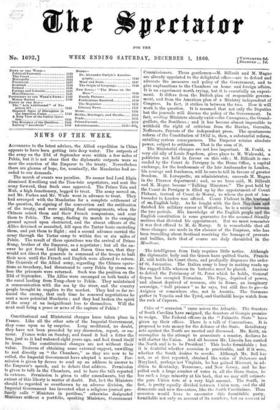Constitutional and Ministerial changes have taken place in France. Like
all the other acts of the Imperial Government, they come upon us by surprise. Long meditated, no doubt, they have not been preceded by any discussion, report, or ru- mour.' woke on Sunday, and found it had a fetter the • less, just -as it had wakened eight years ago, and had found itself in irons. The constitutional changes are not without their value. Desirous of obtaining some external support, unwilling to rest direetly on " the Chambers," as they are now to he called, the Imperial Government have adopted a novelty. Per- mission is given by decree to send up an address in answer to the Emperor's speech, and to debate that address. Permission is given to talk in the Chambers, and to have the talk reported. in extenso. Permission is given to offer amendments, but the .extent of this liberty is matter of doubt. But, led the Ministers should be regarded as overthrown by an adverse division, the :Imperial Government has invented what a religious journal pro- **elk calls " Ministers in partibus," otherwise designated
• Ministert without a portfolio, speaking Ministers, Government
Commissioners. Those gentlemen—M. Billault and M. Magne are already appointed to the delightful Office—are to defend and advocate the measures and policy of the Government, and to give explanations to the Chambers on home and foreign affairs. It is an experiment worth trying, but it is essentially an experi- ment. It differs from the British plan of responsible govern- ment, and from the American plan of a Ministry independent of Congress. In fact, it strikes in between the two. How it will work is the question. It is assumed that not only the Deputies but the journals will discuss the policy of the Government. In fact, writing Ministers already exist—the Cassagnacs, the Grand- guillots, the Bonifaces ; and it has become almost impossible to withhold the right of criticism from the Havins, Geroults, Nefftzners, Peyrats of the independent press. The spontaneous reform of the Constitution of 1852 is, then, a substantial reform, entailing serious consequences. The Emperor retains absolute power, subject to criticism. That is the sum of it.
The Ministerial changes are not less important. M. Fould, a very old ally of Louis Napoleon, gives place to M. Walewski, a politician not held in favour on this side ; M. Billault is suc- ceeded by the Count de Persigny in the Home Office, a capital exchange, for the bonhommie of the late Ambassador in London, his courage and frankness, will be sure to tell in favour of greater freedom. 11. Laroquette, an administrator, succeeds M. Magna in the Finance department ; and, as we have said, M. Billault and M. Magne become "Talking Ministers." The post held by the Count de Persigny is filled up by the appointment, of Count Flahaut, instead of Count de Moray, to whom the post of Am- bassador in London was offered. Count Flahaut of ay4Englisb:lady,. As he fought with..the first %%pain*. finishea his military career at Waterloo; he is a neiuS bet the two periods. His knowledge of the English people and the English constitution is some guarantee for the assumed friendly motives that dictated his appointment. But we must remember it was first offered to M. de Morny. It is remarkable that all these changes are made in the absence of the Empress, who has been travelling about Scotland receiving the homage of provosts and baillies, facts that of course are duly chronicled in the lifoniteur.


























